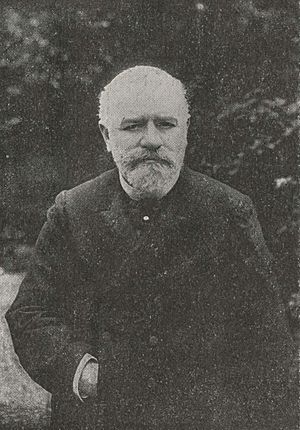Jan Gotlib Bloch facts for kids
Quick facts for kids
Jan Bloch
|
|
|---|---|
 |
|
| Born | July 24, 1836 |
| Died | January 7, 1902 (aged 65) |
Jan Gotlib Bloch (born July 24, 1836 – died January 7, 1902) was a very smart Polish businessman. He was a banker and helped fund the building of railways. But he also spent a lot of his time studying how modern wars were fought. He was born Jewish but later became a Calvinist. He worked hard to fight against unfair treatment of Jewish people by the Russian government. He also supported the idea of a Jewish homeland.
Bloch studied at the University of Berlin. He worked at a bank in Warsaw. Later, he moved to St. Petersburg, which was the capital of the Russian Empire. At that time, Russia ruled over much of Poland.
In St. Petersburg, Bloch helped develop the Russian railway system. He found ways to pay for new railways. He also wrote important research papers about them. He started many companies for banking, credit, and insurance. In 1877, he became a member of the Russian Finance Ministry's Scientific Committee.
Bloch was married to Emilia Julia Kronenberg. Her family, the Kronenbergs, were also famous Polish bankers and business people.
Contents
Bloch's Ideas About War
Jan Bloch spent a lot of time studying how wars were changing. He wrote a huge book called The Future of War in its Technical, Economic, and Political Relations. In this book, he predicted that future wars would be very different from past ones.
He believed that new weapons like powerful rifles and machine guns would make it impossible for soldiers to charge across open fields. He thought that wars would become long, slow battles where armies dug into trenches. This kind of fighting would use up huge amounts of money and resources. He called this "industrial warfare."
Bloch also predicted that such a war would be so costly and deadly that it would lead to social problems and even revolutions. He thought that no country could truly win such a war.
Spreading His Message
Bloch went to the first Hague Peace Conference in 1899. This was a meeting where countries tried to find ways to prevent wars. He might have been invited by the Russian ruler, Tsar Nicholas II. Bloch gave copies of his book to leaders from 26 countries. But most people did not listen to his warnings.
A British writer named W. T. Stead tried to help spread Bloch's ideas. But many military leaders in Europe did not believe him. They thought his ideas were wrong or would hurt the soldiers' spirit.
Sadly, Bloch's predictions came true with World War I. Soldiers had to learn his lessons the hard way, through terrible battles and trench warfare. The rulers of Russia and Germany also faced revolutions, just as Bloch had warned.
What Bloch Missed
Bloch was very smart, but he didn't predict everything. He didn't fully understand how important artillery (big guns) would become. He also didn't foresee the invention of tanks or military airplanes. He also didn't realize how important cars and trucks would become for moving armies.
However, these small misses didn't change his main point. He was right about how deadly and costly modern wars would be. His ideas were very accurate for the period before about 1930.
Bloch's Legacy
Jan Bloch died on January 7, 1902, in Warsaw. In the same year, an International Museum of War and Peace was opened in his name in Lucerne, Switzerland. However, the museum closed in 1919 because not enough people visited it.
Why His Ideas Were Ignored
Bloch lived long enough to see that military leaders weren't listening to him. He realized that he might need to talk directly to regular people and voters instead.
Today, experts see Bloch as a very important thinker about war, much like Carl von Clausewitz. A study in 2000 looked at how military experts reacted to Bloch's ideas. It found that they often ignored him. They thought his "math" might be right, but they worried his message would make soldiers lose hope.
See also
 In Spanish: Ivan Bloch para niños
In Spanish: Ivan Bloch para niños
- List of Poles
- The Great Illusion
 | Calvin Brent |
 | Walter T. Bailey |
 | Martha Cassell Thompson |
 | Alberta Jeannette Cassell |

